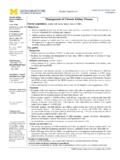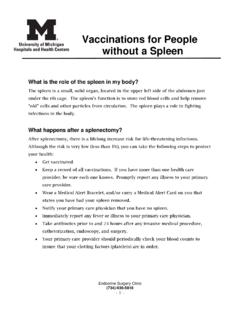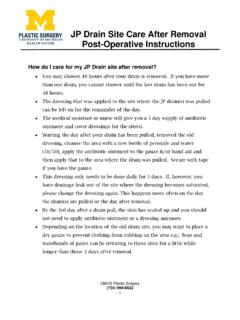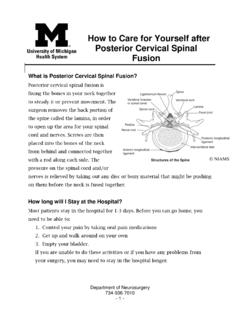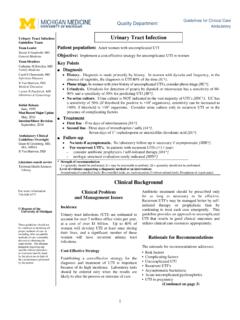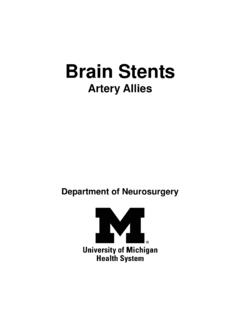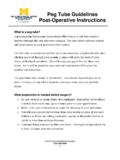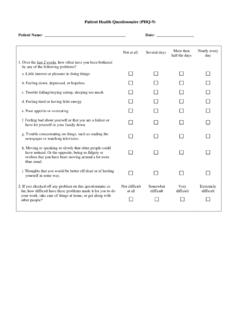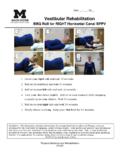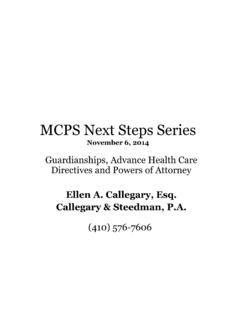Transcription of Transition For Youth with Intellectual Disabilities
1 1 Transition For Youth with Intellectual Disabilities Department of Social Work 2 3 Acknowledgements We got information in this booklet from the following organizations. They all have useful information to plan for Youth with Intellectual Disability. ARC The Arc Michigan facilitates a statewide network of local chapters assisting persons with developmental Disabilities and their families through education, training, technical assistance and advocacy. 800-292-7851 or 517-487-5426 Michigan Department of Health and Human Services (MDHHS) MDHHS is the department of the state government whose goal is to protect, preserve, and promote the health and safety of the people of Michigan.
2 MDHHS looks out for the needs of vulnerable and under-served populations. Services are administered throughout the State of Michigan through multiple agencies, including the Department of Health and Human Services, the Department of Public Health, Community Mental Health Agencies and local school districts. 517-373-3740 Michigan Protection and Advocacy Service (MPAS) MPAS promotes, expands and protects rights of people with Disabilities through information and advocacy. MPAS tries to answer questions you may have relating to disability.
3 They have experience in the following areas: discrimination in education, employment, housing, and public places; abuse and neglect; Social Security benefits; Medicaid, Medicare and other insurance; housing; Vocational Rehabilitation; HIV/AIDS issues; and other topics. 800-288-5923 (Toll Free) or 517-487-1755 Pediatric Advocacy Clinic (PAC) The PAC focuses on improving health outcomes for low-income children. Developed by clinical faculty in the University of Michigan Law School, the PAC provides legal advocacy training and support to pediatric providers at the University of Michigan Ypsilanti Health Center, the pediatric social work team at University of Michigan Mott Children s Hospital, the Corner Health Center, and the Washtenaw County Department of Public Health Maternal Infant Health Program.
4 734-763-1942 i 4 Social Security Administration (SSA) The SSA administers income to disabled Americans. 800-772-1213 Department of Housing and Urban Development (HUD) HUD directs housing programs for low-income and disabled Americans including: FHA first-time homebuyers program, Housing Choice Vouchers, Section 202, Project-based Section 8, and Public Housing programs. 202-708-1112 ii 5 Table of Contents Introduction .. 1 guardianship .. 9 15 Health Insurance .. 19 Housing .. 22 Community Supports .. 26 Medical Equipment.
5 33 Resources for Transition Planning .. 36 Conclusion .. 37 6 Introduction Disability is a natural part of the human existence and in no way diminishes the right of persons with developmental Disabilities to live independently, enjoy self-determination, make choices, contribute to society, and experience full integration and inclusion in the economic, political, social, cultural, and educational mainstream of American society. - The Developmental Disabilities Assistance and Bill of Rights Act Amendment of 1993 Why is Planning Important?
6 We all go through transitions in our lives, from infancy to childhood, from preschool to elementary school to high school, and from adolescence to adulthood. Planning ahead and preparing for changes helps make things easier. It is important to plan for the Transition from pediatric doctors to adult doctors, moving from school to adult life. It is never too early to think about and prepare for your child's future. Transitions for teens with Intellectual Disabilities (ID) can be especially challenging. When teens turn 18, they are legally independent persons.
7 An 18-year-old teen is assumed to be able to make medical, financial and life decisions on his/her own. People who are 18 are able to start receiving their own medical information and signing consent forms for medical procedures. Doctors and hospitals, government programs and social service agencies need written permission to speak with anyone else about that person. All of this can be a challenge for a person with ID and the family. If you don t prepare for the day the person with ID turns 18, there may be disruptions in insurance, health care and supportive services.
8 It Takes a Village This ancient African proverb, it takes a village to raise a child , is very true. No man, woman, or family is an island, especially when caring for a child with ID. Whole communities including families, schools, businesses, employers, health 7 care providers, public service agencies, and many others, must work together to find, and share resources to help a successful Transition to adulthood. Services coordinated between all agencies are important for persons with ID. When able, the person with ID should be independent and be giving and respected members of their communities.
9 When they are more impaired, agencies should provide a safety net for the families that care for them. The planning process for the change should be thoughtful, person-centered, and take into account the person's unique abilities and challenges. Transition planning should help a person with ID and family by providing information about community-based services and support, Social Security Income, and affordable housing options. We hope this manual helps you understand services for persons with ID over the age of 18 in Michigan.
10 All young adults are different, as are all families. There is no single right plan for Transition to adulthood. What some families want for their child may or may not be what you want for yours. The best planning occurs when the family, the school, service agencies, medical professionals and others caring for your child work together. This will improve your child s employment ability, continuing education options, housing options, and have a meaningful life that continues after school. 8 When to ask for Social Work There is a Social Worker in most inpatient areas and outpatient clinics at Mott Children s Hospital.
